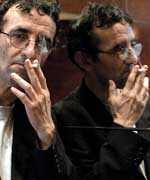 Francisco Goldman recently acknowledged that potential converts to the work of Roberto Bolaño might be turned off by the media “hype assault.”
Francisco Goldman recently acknowledged that potential converts to the work of Roberto Bolaño might be turned off by the media “hype assault.”
Yet he argued, at a National Arts Club tribute to the late writer, that the praise being heaped on Bolaño originates not with newspaper editors moving in lockstep, nor with the publisher’s publicity department, but with readers themselves.
“It reminds me of what happened in Mexico,” said Goldman. “The passion is coming from the readers up.”
Bolaño fever spread across the Spanish-speaking world even more swiftly than it has overtaken the States. Less than a year before his reputation skyrocketed at home, Bolaño meandered unmolested and unrecognized around the Paris Book Fair. He eventually approached the table devoted to Latin American literature.
“Are you interested in Latin American writers?” asked the earnest table attendant.
“You could say so,” Bolaño said. At the attendant’s suggestion he wrote down his name, which didn’t spark the slightest flicker of recognition, to receive future mailings.
This anecdote surfaced at the tribute, where The Savage Detectives was as engagingly riotous and bizarre read aloud as it is when savored — and cackled over — in private. As James Wood wrote recently:
A novel all about poetry and poets, one of whose heroes is a lightly disguised version of the author himself: how easily this could be nothing more than a precious lattice of ludic narcissism and unbearably “literary” adventures! Again, Bolaño skirts danger and then gleefully accelerates away from it. The novel is wildly enjoyable (as well as, finally, full of lament), in part because Bolaño, despite all the game-playing, has a worldly, literal sensibility. His atmospheres are solidly imagined, but the tone is breezy and colloquial and amazingly unliterary.
Among the readers and speakers at the National Arts Club event was Carmen Boullosa, Bolaño’s friend who recently remembered him in The Nation. She maintains that The Savage Detectives is mere juvenilia in comparison with 2666 (the English translation doesn’t appear until next year), which she believes to be Bolaño’s finest work.
Her high opinion of the later novel was seconded over drinks after the reading by both Goldman and Jose Prieto. The liquor was flowing freely by then, so I can’t say for sure, but I believe it was Goldman who made the impassioned case that 2666 is a stronger work of postmodern fiction than anything Pynchon or DeLillo has written.
Bolaño wrote the final book in a mad rush, when he knew he was dying. There were to be five parts — the last of which was left partly unfinished — and he asked a friend to have them published in separate installments, as discrete books, so that his children could live off of the proceeds.
Ultimately, though, the friend disobeyed Bolaño’s instructions. He concluded that the power of 2666 is cumulative, and indivisible.
See also Aura Estrada’s Borges, Bolaño and the Return of the Epic.